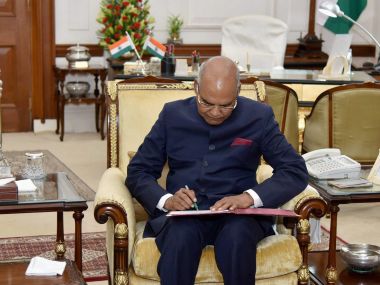President Ram Nath Kovind’s maiden speech after his swearing-in ceremony at the Central Hall of Parliament has practically jettisoned whatever was left of Nehruvian legacy and outlined his own idea of India.
Obviously Kovind’s elucidation about the country and its people was in congruence with the Narendra Modi government’s view. Devoid of complex and often incomprehensible academese, the President’s exposition in Hindi was clearly a radical departure more for its content than the style of delivery.
Though the post of President is usually regarded as an ornamental creation of the Constitution, Modi has not relied on this assumption. Quite unlike the presidents chosen by Indira Gandhi, Rajiv Gandhi and Manmohan Singh-Sonia Gandhi in the past, Kovind was not chosen for his pronounced malleability and amenability to the government. Far from it, he was chosen to symbolise assertion and aspiration of subalterns, particularly Dalits. He is neither a classic RSS activist nor a radical Ambedkarite given to anti-upper caste sentiments.
In his speech, Kovind never lost sight of this political objective. He spoke in an accessible language which can easily find resonance across the Hindi belt. He talked about having come from a “mud house” from Kanpur Dehat. At the same time, he was quite effusive in his praise for ordinary men and women who are rarely referred to in such an occasion.
For instance, he talked highly about men and women involved in mundane works like launching start-ups or toiling for hours on end in the field. He specially mentioned about the contribution of housewives in making of India.
Perhaps from the podium of the Central Hall, the President of India for the first time clearly delineated the salient features of “idea of India”, which is in consonance with the government’s world-view. And there is a little doubt that his defining features of India were dissimilar to the Nehruvian mould.
That is the precise reason why Kovind mentioned Mahatma Gandhi, Sardar Patel and Bharatiya Jana Sangh (BJS) ideologue Deen Dayal Upadhyaya in his speech but chose to ignore Nehru-Gandhi family completely. Similarly, while mentioning about his predecessors, he did take names of Rajendra Prasad, Dr Radhakrishnan, APJ Abdul Kalam and his immediate predecessor Pranab Mukherjee but avoided a list of other ex-presidents with Congress background.
Interestingly, Kovind does not come from the RSS background. Yet his disciplinarian life ingratiated him to the BJP’s culture over his nearly 25 years of association with the BJP. Having served as close aide to Morarji Desai, Kovind found nothing amiss in the company of the Sangh Parivar and endeared himself to top BJP leaders, particularly Modi, in his stint as the BJP activist. He was frequently called to Gujarat to mobilise his own community, Kolis, in support of the BJP.
The manner in which the swearing-in was chosen as an occasion by the President to explicate his vision of the country is without precedent. And there is a reason for that. Though Kovind belongs to Dalit community, he does not wear this identity on his sleeves like many Ambedkarites.
At the same time, Kovind’s ascension to the post of President is a direct repudiation of traditional Dalit politics in which those with illustrious background prosper. For instance, KR Narayanan was a scholarly President who came from Dalit background, his stint as diplomat had substantially eclipsed his Dalit identity. Kovind, on the other hand, comes across as quintessential representative of Dalit identity in Hindi heartland.
What is particularly significant is the fact that unlike the Presidents in the past, Kovind is a genuine product of anti-Congressism. Unlike Presidents in the past, Kovind carries no burden of the political legacy of his predecessor. If his speech is any indication, Kovind’s next five year stay at the Rashtrapati Bhavan is bound to be more political than mere ceremonial. And that will be a new beginning.


)




)
)
)
)
)
)
)
)